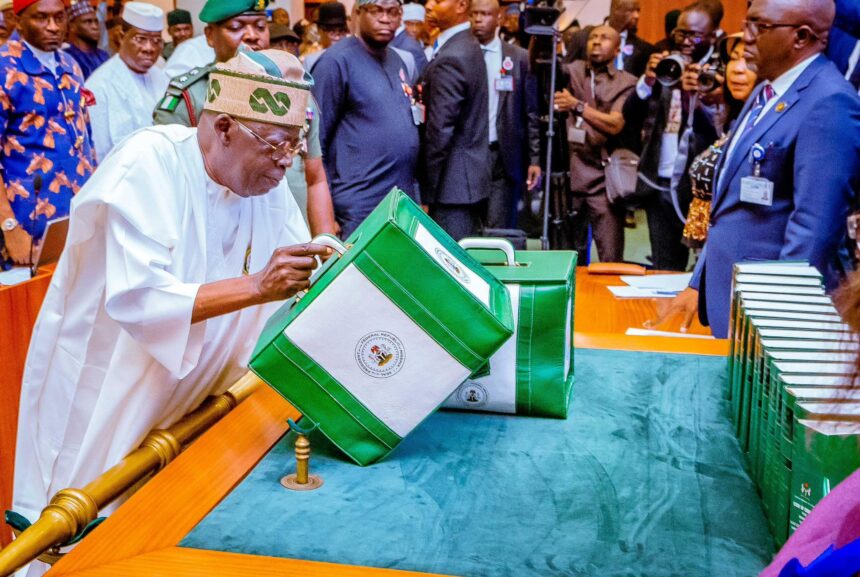The decision by President Bola Tinubu to increase Nigeria’s 2025 budget from N49.7 trillion to N54.2 trillion, marking a 9% raise, has sparked a range of discussions among economic analysts, politicians, and other members of the Nigerian public.
Tinubu, had in a letter addressed to the National Assembly and read by the President of the Senate, Senator Godswill Akpabio, sought an additional allocation of N4.53 trillion to N49.7 trillion 2025 Appropriation Bill initially presented to the National Assembly on December 18, 2024.
According to Akpabio, the increase arose from N1.4 trillion in additional revenues from the Federal Inland Revenue Service, FIRS; N1.2 trillion made by the Nigeria Customs Service, NCS; and N1.8 trillion generated by some other government-owned agencies.
In the letter, the Nigerian President stated that allocations of N1.5 trillion for the Bank of Agriculture and N1.5 trillion for critical infrastructure projects would enhance food security and economic activity through improved transport systems.
The President also explained that the budget increase includes funds for military housing and aviation, which would improve security, a critical component for national stability and economic growth.
Additionally, Tinubu has indicated that the budget aims to reduce inflation from 34.6% to 15%, potentially stabilizing the economy if these projections hold.
Shedding more light, the Minister of Budget and Economic Planning, Senator Atiku Bagudu, said the increase in the 2025 Appropriation bill was necessary for the government to have more revenue to strengthen the Bank of Agriculture, Bank of Industry and support the diversification programme by putting more money in the solid minerals sector as well as infrastructure projects.
Bagudu, who addressed a press conference on Wednesday explained that the increment came after it was established that some government agencies can improve in their revenue generation.
He said: “In that process, the Senate Committee on Appropriation, Senate Committee on National Planning, and Senate Committee on Finance established that we can generate more revenue by tasking all the institutions to do more, and the Federal Inland Revenue Service (FIRS) confirmed the ability to do more than was submitted.
“Equally, it was established that government-owned enterprises can contribute more revenue, as well as the Customs Service. So additional revenue, amounting to over N4.5 trillion, was established, and this was taken to the President.”
On adjustment of the Medium Term Expenditure Framework, MTEF, Senator Bagudu said: “Recall that even when the budget was submitted, MTEF was amended.
“The MTEF that was initially approved was for a budget of less than N49 trillion, so it goes together and so the consequential amendment to the MTEF will certainly follow.”
Meanwhile, some experts have begun to point out what they described as a “lack of structural reforms and fiscal discipline in the budget.”
With the budget deficit projected at N13 trillion and debt servicing at N15.8 trillion, there’s worry about the sustainability of Nigeria’s public debt, which could lead to higher borrowing costs and economic risk.
The budget increase is based on additional revenue from government agencies. However, some experts said if these revenue projections do not materialize, it could lead to further budget adjustments or increased borrowing.
Commenting on the increase in the 2025 Budget, David Adonri, Analysts and Executive Vice Chairman at Highcap Securities Limited, said: “The financial management practice of FGN does not inspire confidence. This is because of conflicts between fiscal policy and monetary policy. While the fiscal policy is expansion, as exemplified by growing fiscal def, which fuels inflation, monetary policy is contractionary to rein in inflation caused by excessive public spending amidst scarcity of goods.
“The lack of conscious effort by FGN to balance the budget to bring sanity to public finance, promote economic stability and facilitate non-inflationary growth to the economy beats my imagination. The recent increase of FGN’s budget by N4 trillion while the government is still running an over-bloated budget deficit is a big threat to bringing its inflation rate to 15% this year as projected in the Appropriation Act. If FGN is earning higher revenue than projected, why not use the excess to defray the deficit?”
A former President of the Chartered Institute of Stockbrokers (CIS), Oluwole Adeosun, in his opinion, said: “I have always been an advocate for an ambitious budget because that’s the only way we can improve our grossly inadequate infrastructure before we can even contemplate gravitating towards a productive economy.
“On a per capita basis if you look at our budget, we are way below that of countries with similar demographics in terms of population and age. How, then, do we hope to lift our people out of poverty when the government itself isn’t spending enough to raise people’s standard of living?
“It’s clear the increase in budget will increase the size of the deficit which stands at about N13 trillion at the moment. I would, however, like to see adjustments that might have been made to the revenue assumption in the new budget to know the quantum of the increase. However, the fact that the budget increase is occasioned by increased revenue collection by various government agencies is positive,” he said.
“For me in as much as the budget is faithfully implemented and monies spent judiciously, we should not have any issue. It is, however, important that we keep our eye on ratios such as debt to revenue and debt to GDP to ensure we do not tip into over-leveraged territory,” Adeosun concluded.
Reacting as well, Clifford Egbomeade, Public analyst and communication expert, said: “The N4.5 trillion increase in Nigeria’s 2025 budget to N54.2 trillion is based on projected revenue gains from the FIRS (N1.4 trillion), Customs (N1.2 trillion), and other agencies (N1.8 trillion). While this suggests improved revenue collection, the real issue is whether these projections are realistic and sustainable. Historically, Nigeria has struggled with revenue underperformance, and an overestimation can widen the fiscal deficit, forcing more borrowing. If not properly managed, this could further drive up inflation and debt servicing costs, worsening economic instability.
“More spending can be beneficial if it is strategically allocated to critical sectors like infrastructure, healthcare, and job creation. However, Nigeria’s weak budget execution and corruption risks raise concerns about waste and mismanagement. Without strict oversight, this budget increase may not translate into meaningful economic growth. The National Assembly must ensure that these additional funds are backed by concrete revenue inflows and spent on projects that deliver measurable results”.





